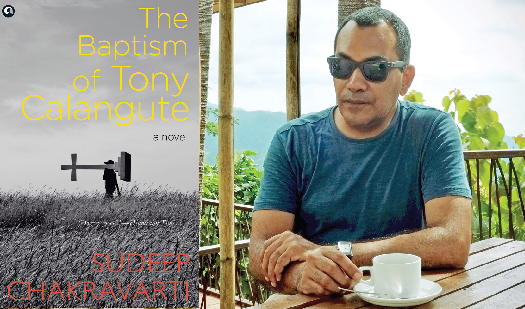Sudeep Chakravarti’s latest book ‘The Baptism of Tony Calangute’ is both a story of love for Goa as well as a lament over how she is gradually losing her soul to corruption and rampant development

CHRISTINE MACHADO
#TGLIFE: What inspired you to write The Baptism of Tony Calangute?
Sudeep Chakravarti: The book came to life about three years after I moved to Goa in 2004. I had regularly visited Goa prior to that, and was fortunate to have friends who introduced me to Goa as only Goenkars can. But after I moved here, the engagement became more intimate, more immediate. I saw at first hand the issues, struggles and dreams of Goans; the constant concern of losing the soul of Goa to rampant development and great corruption. I wrote several articles and essays. And I wrote The Baptism of Tony Calangute. It is born out of love for Goa, even though it can be read as a lament as much as a story of this abiding love, of the magic of Goa as well as what I like to call ‘Malaise de Goa’. Although Tony Calangute is set in Goa, it could also be read as a story of any place which is a ‘paradise’ under siege.
What was the kind of research that went into the making of this novel?
It was a process of immersion in history, geography, culture, religion, cuisine, languages, politics, festivals, the economy etc. I soaked up all this, as I soaked up the Goan seasons, the life-rhythms of Goa. My friends and acquaintances were invaluable in explaining Goa. Some of them read the manuscript and offered suggestions. What were some of the challenges you faced while penning it?
To encapsulate the essence of modern Goa, the magic of Goa as well as ‘Malaise de Goa’ in a novel, let alone a work of non-fiction, is difficult. But a way came to me: a dual narrative that weaves dark satire, a certain lyricism, and magic realism. This allowed me to tackle a complex story and humanize it. I had also to be careful about detailing, getting the linguistic and cultural nuances right.
This is your third novel. What have been your learnings on writing fiction?
Fiction is an absolute delight and absolutely wrenching to write. At least for me, as I invest so much emotion in the story. It is also a relatively more difficult narrative to construct than a work of non-fiction, of which I have written several, including most recently a biography of my other homeland and my other family, The Bengalis: A Portrait of a Community. I could easily have a written a non-fiction book about Goa, but a novel allowed me to explore dimensions, make references and make points that may not have been possible with non-fiction.
Your works of fiction deal with themes taken from real life. Does this make it harder to pen the tale?
Not really, because writing a novel, a work of fiction, is an altogether different approach than non-fiction. For a work of fiction, I need to be in a different frame of mind, look at a story differently. A novel becomes more of a distillate of life that allows a writer to marry fact with imagination and any style the writer chooses, from a straight telling, to allegorical, to satirical. It’s a bit like jazz: there is a story, and there is form, and there is also a lot of improvisation.
What is your take on the attention that books by local authors get?
Goa has a problem of plenty with four languages! Seriously though, it is good that platforms exist in all four languages, and that some local publishers and bookstores are increasingly taking pride in showcasing local writers. Bhai (Damodar-bab Mauzo) has for long been a beacon of writing in Goa. Margaret Mascarenhas is a force in literary writing and poetry in English and Spanish. Venita Coelho has made an insistent impression writing for young adults. Manohar Shetty, whose soul is Goan, continues to write searing poetry. Several writers from across India and the world now call Goa home. Taken together, I hope it all leads to greater creative churn and greater nurturing.
What is your hope of this book?
I hope it holds up a mirror to those who destroy Goa and provides a message to those who would preserve Goa.
(‘The Baptism of Tony Calangute’ is available on Amazon Kindle and will be available at most online stores by mid April.There will be a formal launch at People Tree, Assagao on May 14)